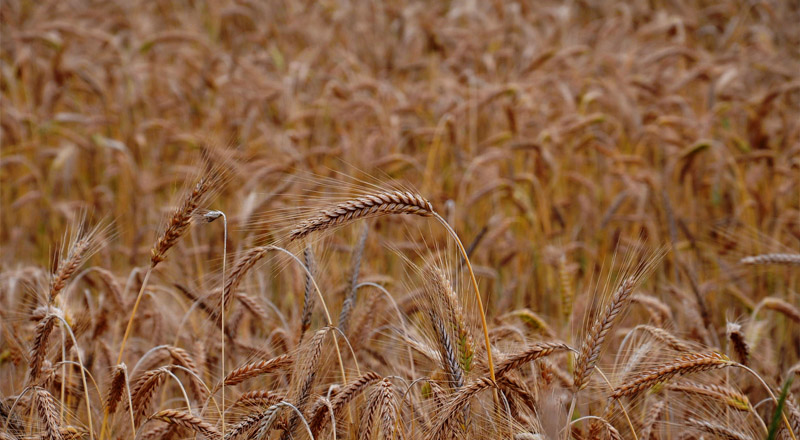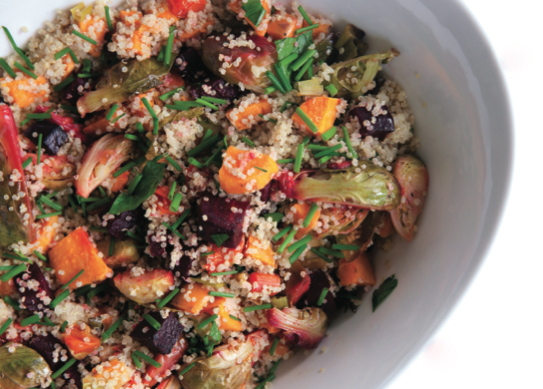Simplicity Saturday – Good Carbs vs. Bad Carbs

I am not a fan nor an educator of any programs that teach individuals to eliminate carbohydrates (or any of the macronutrients for that matter). This is especially the case when it comes to things like bread. Could you imagine a lifetime of no bread? That would be torture, awful and so senseless. It’s not bread that makes us gain weight or makes it difficult for us to lose weight, nor is it pasta, rice or cereal. It is the type, quantity and quality of these carbohydrates that we are consuming.
Complex Carbohydrates vs Simple Carbohydrates: Complex carbohydrates have a longer train of sugars to breakdown, also called “poly-saccharides”. We can think of complex carbohydrates as bunch of train cars linked together. The more complex the carbohydrate, the more cars the train has. The longer the train is, the longer it takes for our body to breakdown and digest.
Simple carbohydrates or “mono-saccharides” are easily digested and used as immediate fuel for the cells. This would be okay if we all went to work the field all day long. However, for the majority of people, we don’t burn that fuel immediately. And when there is excess fuel that our cells can’t utilize immediately, it is stored and saved for future use. If our body still doesn’t get around to using it, it turns that fuel into fat as a long-term storage solution.
Complex Carbohydrates: These types of carbohydrates keep us fuller for longer and don’t have such a dramatic impact on our blood sugar levels or our moods.
- Green vegetables
- Whole grains and foods made from them, such as oatmeal, spelt, kamut, barley, rice, quinoa, and whole-grain/sprouted grain breads
- Starchy vegetables such as potatoes, sweet potatoes, pumpkin, squash, carrots, peas, beans
- Beans, lentils, and peas
- Fruits such as bananas, apples and pears
Simple Sugars: Simple carbohydrates are monosaccharide or disaccharide sugars. Glucose and fructose are the most common naturally occurring monosaccharide sugars. Simple carbohydrates include foods that are laden with sugar and contain little nutritional value or that do not contain any other nutrients such as fat, protein, vitamins, minerals or fiber.
|
|
Fiber is the part of plants that cannot be digested. Fiber is found in all veggies, fruit, beans, seeds (hemp, flax & chia especially) and nuts. But are you getting enough fiber? Most of us are not and this can result in sluggishness and constipation. The lack of fiber can make us feel irritable when food moving through our bodies is slowed down, plus eating enough fiber can keep us stay slim.
Soluble fiber – found in oats, oat bran, oatmeal, beans, peas, barley, berries and citrus fruits can help lower cholesterol.
Insoluble fiber – apples, pears, whet bran, whole grain cereals, rye, brown rice, cabbage, brussel sprouts, carrots, beets and turnips, is important for normal bowel function.
Adding more fiber is a simple change with great benefits, just make small adjustments of time while increasing your water intake to avoid any unpleasant side effect
In the Body
All carbohydrates are eventually broken down in to glucose. Complex carbohydrates are the preferred source of glucose while fruits and veggies supply fructose and sucrose. Since they don’t have to be broken down through digestion, simple sugars are readily absorbed into the blood stream.
Fruit juices, candy, sugar, honey etc are concentrated sources of fructose. Whole fruits on the other hand, although still high in sugar, are diluted with water and contains sources of fiber, along with other vitamins and mineals. For this reason, fruit does not have the same dramatic effect on the blood sugar as eating sweets or drinking juice.
Carbohydrates that have to be broken down, like starches, go through the digestive system, where enzymes break the units into smaller pieces in the small intestines. Once in the bloodstream, glucose can either be taken up by the cells and used for fuel, stored in the liver or converted to fat for later use. Levels are regulated by our glandular/endocrine system (hormonal system).
Since only a small amount of glucose is stored as glycogen, it must be replenished daily through eating. If levels are too low your body will turns to fat for fuel, however some glucose is still required to burn fat efficiently. Without glucose, the body still burns fat, but a dangerous condition called ketosis could result.
Unlike other organs in the body, which can use fat to run, the brain and nervous system depend exclusively on glucose for their energy needs. If no glucose is available, the body will break down protein and convert it to glucose to be used by the brain and nervous system. For all these reason it is highly recommend against the use of low carbohydrate diets.
Recommended Intakes:
55-65% of total daily calories should be in the form of complex carbohydrates, such as whole grains, legumes, vegetables and fruits.
Here are some great brands and types of complex whole grain carbohydrates that incorporate into my own life as well as my clients:
Breads
- Ezekiel breads, wraps & english muffins (freezer section of health stores)
- Manna fruit & nut loaves
- Kinnikinnick – totally wheat & gluten-free – make awesome pizza crusts
- Grainfields Kamut & Flax @ Nature’s Emporium
- Stonemill breads any of them are great
- Dimpfilmier breads
- Sha Sha & Co.
- Pita Break Muesli Pita Breakfast Pita
- Home made snacks and breads: for recipes try Oh She Glows, Natures Emporium or Whole Foods
Pastas (available at Superstore & Natures & bulkbarn & Loblaws)
- Whole wheat or Multigrain
- Artesian Acres Kamut or Spelt
- Brown Rice or Quinoa pasta
- Ezekial pasta
Rice
- Lundberg rice – all of them are fabulous, no need to look any further!
Cereals
- Kashi products…I love Kashi Go Lean Crunch
- Power O’s – new on the market, made of lentils!
- Nature’s Path organic cereals and granola
- Barbara’s
- Nature’s Path organic Oatmeal
- Steel Cut Oats
- Dorset
- Bare Naked Granola
- Cheerios, bran buds, wheat squares aren’t bad if you accessorize them with raw nuts, seeds and fresh fruit
It’s just not reasonable to begin a diet or new eating plan that asks you to give up staples of your diet. And there is nothing wrong with carbs, as long as they are whole grain based, a mix of some with wheat and some without is a GREAT way to balance your system. You have to understand that wheat is in everything, whether it’s listed as wheat, wheat flour, wheat bran, wheat starch, wheat gluten…you get the idea! Too much of anything is never a good thing, but on top of being over consumed, wheat is also over-processed and handled, sometimes even GMO’d (genetically modified organism), so reducing not only your own intake but your family’s as well is in your best health and environmental interest.
Side note – if you or someone you know suffers from asthma, eczema, digestive disease or upset, runny nose, headaches or any other on-going chronic ailment, wheat is probably one of the main culprits, along with I’m guessing dairy…and when I say I’m guessing it means I’d bet the bank it is:) If you can relate to the above you should meet with a Holistic Nutritionist to help guide you in the right direction.
Sandwiches, wraps, whole-grain bread/pasta dishes and rice can be part of your healthy diet, within a balance of the other macronutrients (protein and fat). Next time you run out of one of the above and are at the grocery store try picking up something new, one item at time.
Happy Thanksgiving Weekend! If you are the chef this holiday weekend, trying adding some whole grains into your menu, or if you are attending a holiday party – why not bring a this whole grain recipe along with you, for everyone to try?
Roasted Vegetable Quinoa Salad
(From The Simplicity Project, p 144)
- Cook 1 cup organic quinoa to directions on the package. Preheat oven to 400°F
- 2 cups brussel sprouts, washed and halved
- 2 small beets, washed, peeled, and cubed
- 4 rainbow carrots (2 purple, 2 orange), washed, peeled, and sliced in rounds
- 2 medium sweet potatoes, washed, peeled, and cubed 1 leek, washed and thinly sliced
- 2 garlic cloves, finely chopped
- 1 large handful organic spinach, finely chopped
- 1⁄2 cup herbed goat cheese (optional)
- 1⁄4 cup raw pumpkin seeds
- 1⁄4 cup raw hemp seeds
- 1⁄2 cup raw pecan pieces
- 1⁄2 cup dried cranberries
- 1⁄2 cup pomegranate seeds
Place all vegetables on two Pampered Chef stone baking sheets or two cookie sheets. Drizzle with organic olive oil, sea salt, and dried or fresh herbs of your choice. (I love tarragon, chives, and thyme.)
Roast for 20 minutes, toss gently, and roast for additional 5–10 minutes, depending on how al dente or cooked you like your veggies.
Once done, combine with the cooked quinoa, seeds, nuts, cranberries, pomegranates, goat cheese, and top with Jenn’s Dressing (find it on page 146).
May be served warm or room temperature.
Enjoy and if you have any questions or concerns just let me know…it can all be very overwhelming, but then again what new journey isn’t?
Smoothies are a great way to add some clean living into your body. If you haven’t already, sign up for our mailing list and receive our free 21-day Simplicious Smoothie Challenge.
Disclaimer: The information contained is intended to be used for general health care information purposes only, and should not be considered complete or used in place of a visit, call, consultation or advice from a physician and/or healthcare provider. Individuals are encouraged to contact their own private physician or healthcare provider regarding continuation or changes in their symptoms.

